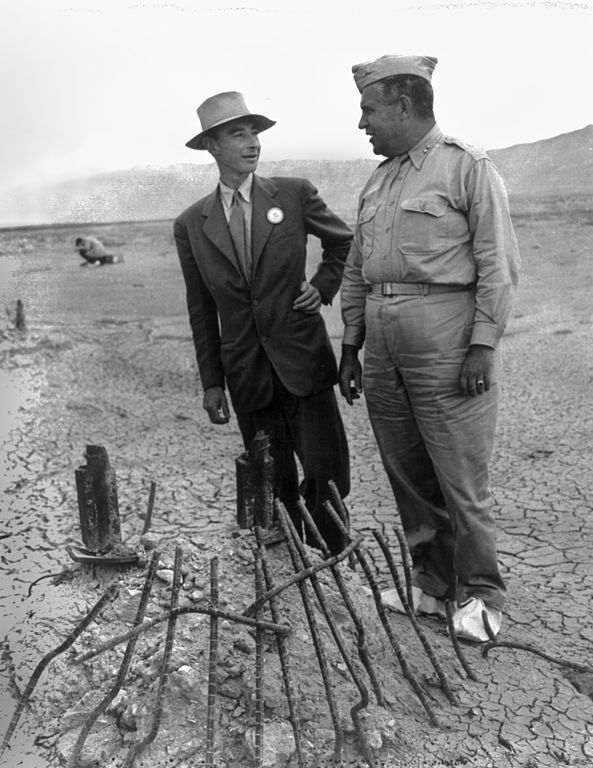A LETTER HOME, AFTER TRINITY, By John Canaday, David Nicodemus, physicist,
Dear Mami,
I am not the same who wrote
you yesterday. The storm has passed. The sun
beats fists against the canvas of my tent
and shakes dust in my eyes with every blow.
I saw a thing last night. I cannot say—
or having said, can’t send. You won’t know what
a while. But even were I there and free
to talk—I have no words. Or only words.
I don’t know what I saw. Frisch said, “A red
hot elephant upended on its trunk.”
The other fellows laughed.
My rhythm’s off.
I saw our village ashed, the men’s school burn
again, remembered how the gusting winds
spread pinwheel sparks. The great bass temple bell
on Mukoyama woke us. Cook helped pack
my wicker case. You wedged me in a second
sweater, hid us in the bamboo grove.
We watched while father fought the flames, filling
our honey buckets at the shallow well,
not fast enough. Smoke smudged his preacher’s skin
a devil dark—his face a Hannya mask—
as though some jealousy had conjured up
the flames that swallowed almost all he loved.
“Heathens,” he might have said, but never did.
He proffered a Trinity, but they preferred
the human godhead of a young marine
biologist. Warlike and practical
and proud, they always had too little faith
in higher powers. Even father’s aide,
old Murayama-san, socked all his cash
in dentures, buying gold teeth one by one.
Old samurai, he had the kids pretend
Hirose-gawa was a castle moat
and taught us how to swim with just our feet,
imaginary swords held overhead,
his leather shako leading and, bone-dry,
its draggled plume. But father thought he knew
God’s will. He spread the Word: “And he rebuked
the winds, and walked upon the waves dry-shod”—
that Christ might be a light to heal blind eyes.
I thought so, too, but planned on getting proof.
A pal and I spent all day laying cable,
sweating our sins away in blazing sun.
Come dusk, we found an empty base camp hut
and stowed our stuff before the storm began.
The roof was tight enough; the instruments
stayed mostly dry. But then brass bullied in.
We packed and grumbled till some G.I. perched
like a sacred lion on the next hut’s steps
shushed us: “The General needs his shut eye.” But
we couldn’t help the engine being cold.
We gunned it till the crankcase glowed, then beat
a tactical retreat to watch God’s will
from a hillside twenty clicks away.
Our friends
were there already, and we sat together
waiting in a deep obscurity
of darkness, like ghosts on a river’s brink,
shivering on the damp earth, fearing, longing
to hear the boatman’s cry.
And suddenly
there came a golden heat of sunlight down
and a purple and a royal light shining,
and I knew that God had blessed and damned us,
granting everything that we had wished.
 J. Robert Oppenheimer, director of the Los Alamos Laboratory where the atomic bomb was designed, and Manhattan Project director Leslie Groves at ground zero of the first detonation of a nuclear weapon, known as the Trinity Test.
J. Robert Oppenheimer, director of the Los Alamos Laboratory where the atomic bomb was designed, and Manhattan Project director Leslie Groves at ground zero of the first detonation of a nuclear weapon, known as the Trinity Test.













